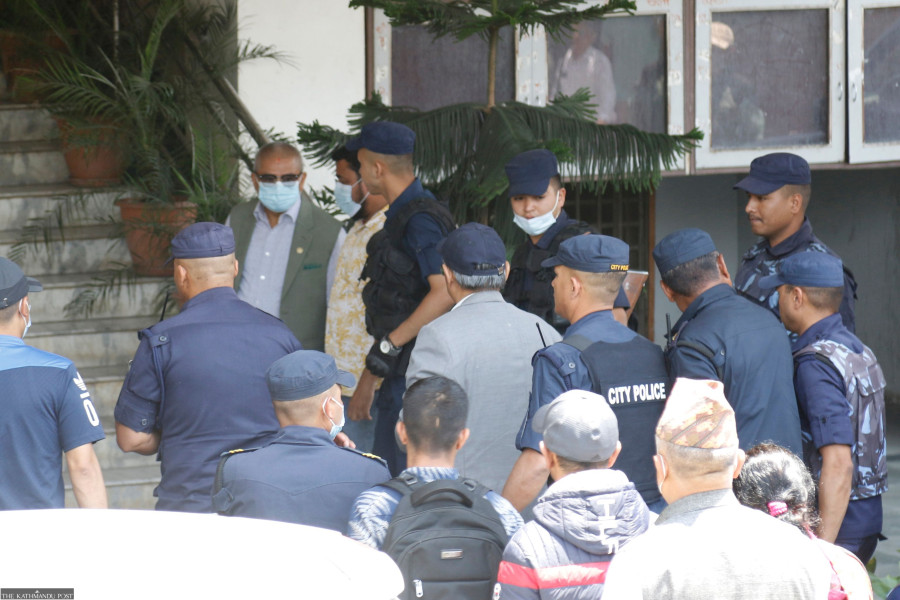National
Lawyers of defendants in fake Bhutanese refugee scam claim selective prosecution
They claim some high-profile suspects were not prosecuted despite being named by defendants as beneficiaries of the scam.
Post Report
Lawyers representing the defendants in the Bhutanese refugee scam started a debate on Wednesday questioning the ‘selective’ prosecution in the case.
After government lawyers concluded their arguments on Tuesday on whether to remand the defendants in the Bhutanese refugee scam, those representing the defendants presented their arguments.
They argued that the defendants have been charged without adequate evidence and only based on the statements of a select few people.
They also argued that the accused were selectively prosecuted with some of top leaders who were accused of involvement in the scam were not prosecuted.
“Some people have been prosecuted because the accused named them while others have not been prosecuted even though they were also named by the accused in the scam,” said Shiva Prasad Rijal, a senior advocate who argued on the behalf of Sanu Bhandari, one of the accused.
Recently, an audio tape appeared on social media that suggested former prime minister Sher Bahadur Deuba’s wife Arzu Rana also allegedly received cash from racketeers attempting to send fake Bhutanese refugees to the United States.
Ajaya Kranti Shakya, adviser to former prime minister KP Sharma Oli, also allegedly received Rs10 million as per the statement of a defendant. They have not been made defendants in the case.
On May 24, the Kathmandu District Attorney’s Office filed criminal cases at the Kathmandu District Court against 30 individuals including former deputy prime minister Top Bahadur Rayamajhi and former home minister Bal Krishna Khand, accusing their involvement in the refugee scam. Of them, 18 have been arrested while the others continue to be at large.
Rijal said the separate charge sheets should have been registered based on alleged offences and degree of offences which could not happen.
The defendants have been charged with four types of crimes—treason, organised crime, fraud and forgery.
Rijal also questioned why Gajendra Budhathoki, who registered the complaints on the behalf of 61 victims, was not prosecuted as he himself was involved in collecting money from the victims.
Budhathoki had registered complaints stating that defendants including Sandesh Sharma, Keshav Prasad Dulal and Sanu Bhandari had collected as much as Rs97.8 million from him and other 60 people known to him.
After the lawyers debating on the behalf of defendants conclude their argument, Achyut Neupane, chief of the Kathmandu District Attorney’s Office, will respond to arguments of the defendants’ lawyers, leaving the court to take the decision.
The district court has set June 14 as the tentative date for issuing an order on whether to remand the defendants. District Court Judge Prem Prasad Neupane has been conducting the hearings on the case.
Earlier, the government lawyers had argued on the behalf of the prosecutor.
Neupane said they argued that the hearings in the case should be continued, keeping the defendants in police custody because of the seriousness of the offences they have been charged with.
Government lawyers including Mahesh Prasad Khatri, Janak Prasad Ghimire, Sitaram Aryal, Dinesh Bhattrai, Prakash Ghimire and Sur Bahadur Pariyar, Nirmala Marasini and Hira Lal Bholon argued against the accused. Some private lawyers including Swagat Nepal also argued against the accused.
The defendants have been chargesheeted for collecting Rs288.17 million from 115 victims—ranging from Rs200,000 to Rs4.8 million per person—promising them to send them to the US in the guise of Bhutanese refugees.
In the court, many defendants have given statements contradictory to what they had told the police. Rayamajhi and Khand said a conspiracy was hatched against them to destroy their political careers while rejecting the charges against them.
In his statement, Khand claimed that he neither had a part in the offence as mentioned in the chargesheet nor did he instigate anyone to get involved in the offences. “All the charges against me are false,” he said.
The charge sheet also names the former deputy prime minister Rayamajhi as the mastermind of the scam. He allegedly played a key role in the disappearance of the actual report of the task force led by Balkrishna Panthi, a former joint-secretary, and replacing it with a fake one. Rayamajhi had even sought the help of another defendant, the Bhutanese refugee leader Tek Nath Rizal.
Even though Rayamajhi said that he had known the Bhutanese rights leader Tek Nath Rizal, he rejected Rizal’s claim that he was involved in the scam. Rayamajhi said he met Rizal only once and claimed that Rizal might have taken his name in order to hide his own crime.
The racketeers had bribed politicians and government officials to include the names of many Nepali nationals on a proposed list of Bhutanese refugees eligible for a third-country resettlement.
After Nepal’s efforts to repatriate the refugees failed, international organisations including the UN refugee agency had explored the third-country resettlement option. Of the around 120,000 refugees staying in camps in eastern Nepal since the 1990s, nearly 113,500 were resettled in various Western countries in a decade-long process. The US alone took in more than 90,000 of them. Around 8,500 Bhutanese refugees were estimated to have remained in the camps after the closure of the third-country resettlement process in 2016.




 18.12°C Kathmandu
18.12°C Kathmandu













